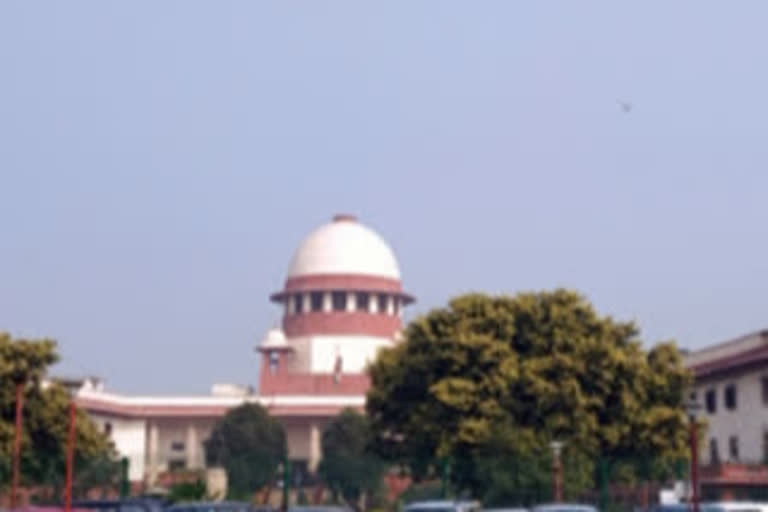New Delhi: The Supreme Court Wednesday said state governments have the power under law to withdraw malicious criminal cases and it is not against the withdrawal of such cases but they should be examined by the high courts concerned.
The top court also expressed concern over inordinate delays in investigation and conclusion of the trial in cases lodged by the Enforcement Directorate and Central Bureau of Investigation against Members of Parliament and MLAs/MLCs and asked the Centre to provide necessary manpower and infrastructure.
A bench of Chief Justice N V Ramana and Justices D Y Chandrachud and Surya Kant said it will pass a detailed order on the issue and pointed out that it was not saying anything or expressing any opinion on the investigating agencies like ED or CBI as it will lower their morale but they should ensure that trials are completed expeditiously.
"We don't want to say anything about investigating agencies as we don't want to lower their morale. Else, their report speaks volumes. There are over 200 cases in these courts. Sorry to say Mr. Tushar Mehta these reports are inconclusive. No reasons have been given for not filing charge sheets for 10 to 15 years. Simply, attaching properties worth crores of rupees does not serve any purpose," the bench said.
The top court is hearing a PIL filed by advocate Ashwini Upadhyay seeking a life ban on lawmakers convicted in heinous criminal cases and speedy disposal of cases against them.
At the outset, senior advocate Vijay Hansaria, appointed as amicus curiae in the matter, told the bench that the status reports of CBI and ED on cases against lawmakers is disturbing and shocking which need surgical treatment for expediting the trial.
CJI Ramana said the court has gone through the ED and CBI reports but it's easy for us to say, expedite the trial, etc. but we are also aware that there are several issues involved with this. There is a shortage of judges, courts and infrastructure. I've also summarised and have prepared some notes. Total 76 cases of ED are pending from 2012 onwards. Over 58 cases of CBI are of life imprisonment and the oldest case is from 2000.
The bench said that it has already expressed its displeasure and reservation to Solicitor General Tushar Mehta over the issue and has asked him to do something. You have to do something about this issue, Mr. Mehta. Don't keep us hanging like this, the bench said, adding that he will have to give some explanation especially for ED and CBI.
Hansaria pointed out that cases are being withdrawn by many state governments by simply saying that these are malicious cases, instituted by previous political dispensation and for no other reasons.
Read: Delhi govt bans use of old diesel and petrol vehicles in NCR
The bench said: "We are not opposing the withdrawal of cases by the state governments. They have the power to do so if they have been maliciously instituted but what we are saying that they have should be examined by a judicial officer or the High Court. The governments must move high courts for the withdrawal of cases. We will examine this point and issue necessary directions."
During the hearing, Mehta said that the top court may issue directions to the investigating agencies to complete the probe within six months and the trial court may be directed to complete the trial in a time-bound manner.
Hansaria told the bench that in cases where investigations are pending before the ED and the CBI, a Monitoring Committee may be constituted comprising --Former Judge of the apex court or the former Chief Justice of a high court, Director, ED (or his nominee), Director, CBI (or his nominee), Home Secretary to the Government of India (or his nominee) and a judicial officer not below the rank of District Judge to be nominated by this Court.
The bench asked Mehta to file his response to the suggestion of constituting the committee. Mehta submitted that in money laundering cases money is mostly parked abroad and it takes time to ascertain the trail of funds and the agency has to send letters rogatory to different countries and wait for their responses due to which enough time is consumed. Hansaria said that 50-60 percent of cases registered by the ED and CBI are pending investigation for 10-12 years and this should be expedited.
The bench told Hansaria that like the judiciary, investigating agencies are also facing manpower crunch and it has to take a practical view on these issues and the Solicitor General can apprise it about the shortage.
We understand manpower is the real issue. We have to take a practical stand. Just like us, investigating agencies are also suffering due to a shortage of manpower. You see, nowadays everyone wants a CBI investigation, the CJI observed, adding, Mr. Mehta we want your cooperation on the issue. You apprise us about the shortage of manpower in investigating agencies.
The bench said it would also clarify in its order that after conviction of a sitting or former lawmaker, his appeal in the high court should not be heard on priority but in the normal course.
The top court said it will pass orders by evening. The top court was informed that over 120 lawmakers including 51 sitting and former MPs are accused of money laundering and being probed by the Enforcement Directorate while 121 others have been booked by the CBI for various criminal offences.
Read: SC asks DoT not to invoke BGs of Airtel for 3 weeks to recover AGR dues of Videocon
PTI



